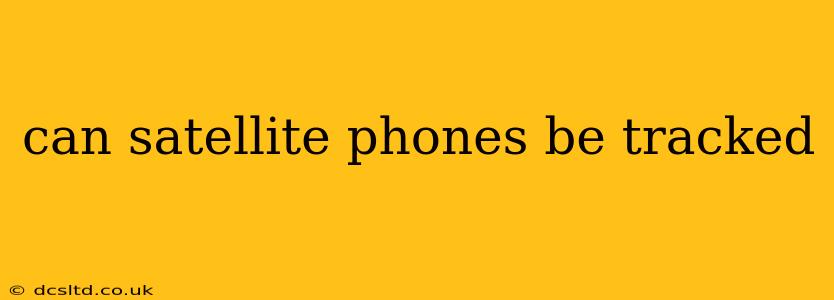The question of whether satellite phones can be tracked is complex, with the answer depending on several factors. While they offer greater privacy than traditional cell phones, they are not entirely untraceable. This guide delves into the intricacies of satellite phone tracking, exploring the capabilities and limitations of different tracking methods.
How Can Satellite Phones Be Tracked?
Satellite phones operate differently than cell phones, communicating directly with satellites instead of cell towers. This difference significantly impacts tracking capabilities. However, several methods can be used to pinpoint a satellite phone's location, albeit with varying degrees of accuracy and legality.
1. Location Data from the Satellite Network Operator: The primary method involves accessing location data held by the satellite phone service provider. Similar to cell phone providers, satellite phone companies log connection data, including the approximate location of the phone when it connects to a satellite. This data, however, is often less precise than cell tower triangulation due to the nature of satellite communication and is usually only available with a warrant or court order.
2. Triangulation Using Multiple Satellites: While less common than with cellular networks, triangulation is possible with satellite phones. By analyzing the signal strength and timing from multiple satellites, a rough location estimate can be derived. This method requires sophisticated equipment and expertise and is less accurate than cell tower triangulation.
3. Physical Tracking Devices: It's possible to physically attach a GPS tracker to a satellite phone, allowing for real-time tracking. This method circumvents the limitations of network-based tracking but requires physical access to the device. It’s important to note that this method would typically only work if the user is unaware of the device.
4. IMSI Catchers (less likely, but still theoretically possible): While less effective than with cell phones, sophisticated interception techniques might, theoretically, be employed to try to gather data from satellite phones. However, this requires specialized equipment and is extremely difficult due to the nature of satellite communication.
Can Law Enforcement Track Satellite Phones?
Law enforcement agencies have access to various tracking technologies and can obtain location data from satellite phone providers with the appropriate legal authorization, such as a warrant. The exact process and level of access differ depending on the jurisdiction and the specific provider. However, the difficulty and time required to obtain such data make it a less commonly used tracking method compared to cellular network tracking.
What About Privacy? Are Satellite Phones Truly Private?
While satellite phones offer enhanced privacy compared to cell phones, they are not completely untraceable. The inherent limitations of the technology mean that metadata is still collected, and with sufficient resources and legal authority, location data can be obtained. The level of privacy depends on the circumstances, the user's awareness of tracking methods, and the technological resources available to those seeking to track the phone.
Are Satellite Phones Used for Illegal Activities?
The enhanced privacy afforded by satellite phones can make them appealing for illicit activities. However, their high cost and limited accessibility limit their widespread use in crime. While they might be used in specific situations to enhance privacy, they are not a ubiquitous tool for criminal enterprises.
What Measures Can Users Take to Enhance Privacy?
Users concerned about privacy can employ several measures to minimize the risk of tracking. These include:
- Being aware of physical tracking devices: Regularly inspect the phone for any unusual attachments.
- Using prepaid and anonymous services: Selecting a provider that offers prepaid service and does not require personal identification.
- Understanding the limitations of satellite phone privacy: It's essential to be aware that complete anonymity is not guaranteed.
In conclusion, while satellite phones offer greater privacy than traditional cell phones, they are not entirely untraceable. The feasibility of tracking depends on the methods employed, the available resources, and legal constraints. Understanding these limitations is crucial for anyone considering using a satellite phone, regardless of their motivations.
